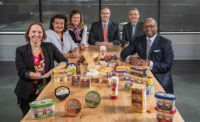At only a decade and a half old, Chobani LLC is still a youngster within the dairy processing universe. Nevertheless, the company — founded in 2005 by current CEO Hamdi Ulukaya, who immigrated to the United States from Turkey about a decade earlier — has racked up a remarkable number of accomplishments.
Moreover, Chobani added considerably to those achievements during the last year or so. The company invested heavily in product innovation, stepped up its commitment to philanthropy, unveiled new efforts to support dairy producers, and continued to demonstrate its mission to “put people before profits.” For these reasons and others, Norwich, N.Y.-based Chobani is Dairy Foods’ 2020 Processor of the Year.
A category disrupter
Chobani has been a standout on the product innovation front from its very beginning. In fact, the company’s wildly popular inaugural Greek yogurt lineup under its eponymous brand essentially disrupted the refrigerated yogurt space.
.jpg)
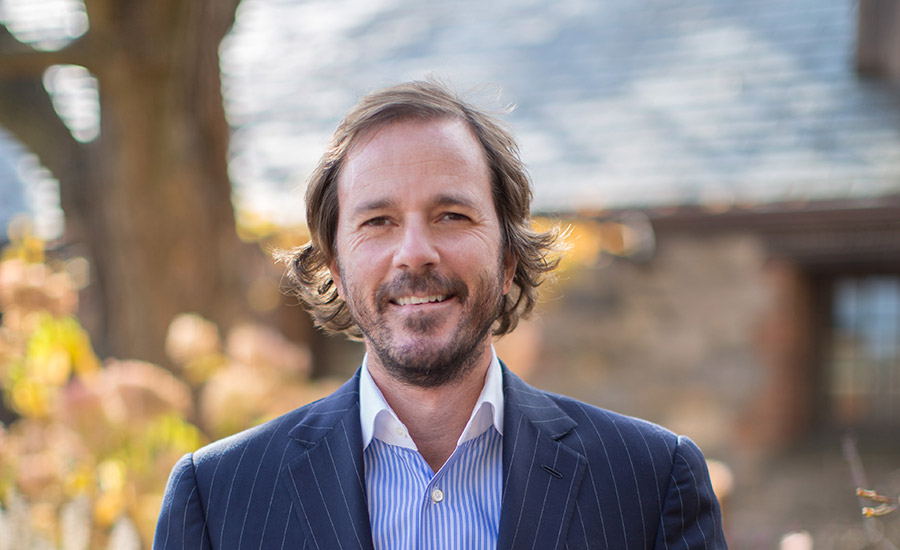
Top - Hamdi Ulukaya, current CEO, founded Chobani in 2005, about a decade after he immigrated to the United States from Turkey.
Bottom - Peter McGuinness is Chobani’s president and chief operating officer.
“We’ve always been innovative,” notes Peter McGuinness, Chobani’s president and chief operating officer. “We’re an entrepreneurial creative company. We’re founder-led. So that’s in our DNA.”
Other Greek yogurt products soon followed, including snack packs, multi-packs and Chobani Flip — “carefully crafted combinations of creamy Greek Yogurt and crunchy mix-ins in flavors inspired by popular and nostalgic favorites.” Those and other innovative launches were designed to expand eating occasions to increase yogurt consumption in the United States, which McGuinness says is still under-penetrated in comparison to Europe and Canada.
“That’s part of our restless spirit, and that’ll never change, but it helps the categories that we compete in,” he says. “It helps disrupt them. It helps make them more exciting, and it helps make natural food more accessible.”
It was in 2019 and 2020, however, that Chobani’s restless spirit truly became evident. In early 2019, the company announced the launch of its first plant-based line: Chobani Coconut. Made from cultured organic coconut and packed with probiotics, the single-serve cups have less sugar than other nondairy brands and contain only non-GMO ingredients and no artificial flavors, sweeteners or preservatives.
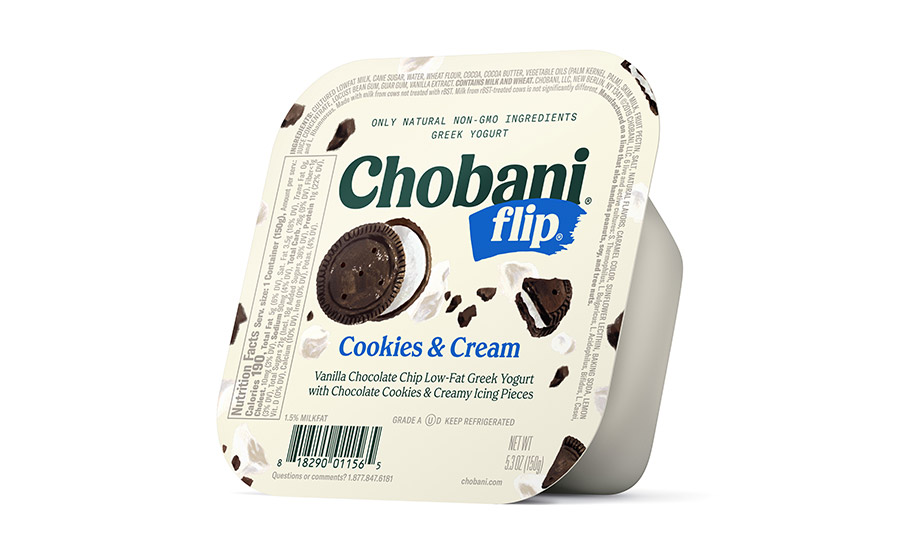
Chobani Flip offerings feature “carefully crafted combinations of creamy Greek Yogurt and crunchy mix-ins in flavors inspired by popular and nostalgic favorites.”
“We’ve come up with a new recipe that’s absolutely delicious, but also meets our food philosophy of being nutritious, made with only natural ingredients and at a price that’s accessible for all,” Ulukaya said at the time of the launch. “Most importantly, this isn’t a replacement for dairy, but it’s a game-changer for plant-based products.”
And in late 2019, Chobani unveiled its largest-ever product line expansion — batch-made nondairy oat-based drinks and nondairy cultured oat blends (cups), as well as dairy-based Greek yogurt with oatmeal (cups) and dairy-based creamers.
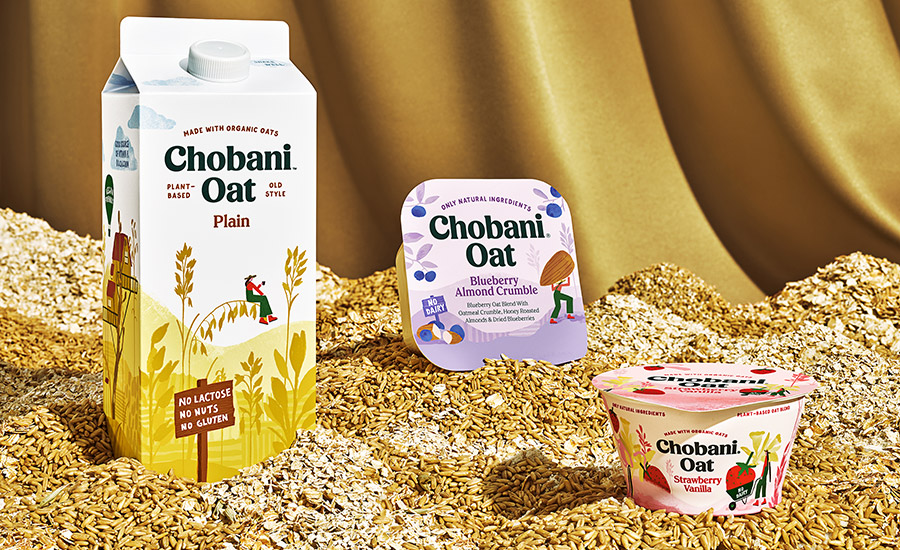
Chobani Oat products include batch-made nondairy oat-based drinks and nondairy cultured oat blends (cups).
“Like yogurt, oats are an ancient food with deep roots in our culture and our land,” Ulukaya said in a press release announcing the new oat-based products. “I always knew our journey from yogurt to becoming a modern food company would be through nutritious, delicious batch-made products like Chobani Oats, and today they’re helping us further deliver on our founding mission of making better food for more people.”
McGuinness is quick to point out that the spate of nondairy product introductions does not take away from Chobani’s dedication to the dairy industry. Instead, the products provide lactose-intolerant and other consumers of dairy alternatives with a “better option” than what existed previously.
“We say we have milk in our veins,” he says. “We love dairy, and dairy delivers an unbelievable amount of nutrition.
“A lot of people launch plant-based at the expense of dairy,” he adds. “We don’t think that’s responsible or right, and we also don’t think that’s the way consumers feel. … Most of what we see are people who are flexitarians, and they are buying nondairy in addition to dairy.”
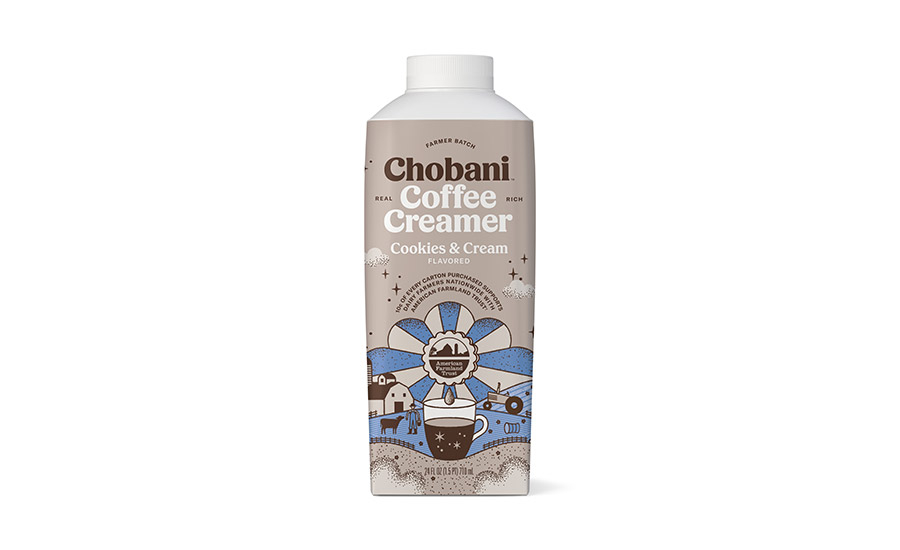
Chobani’s new creamers come in a variety of flavors, including seasonal flavors and even a special edition, Farmer Batch Cookies & Cream, which the company created for dairy farmers in partnership with American Farmland Trust.
As for the new dairy creamers, McGuinness says they were a natural fit for Chobani, which routinely found itself with cream left over from production of its nonfat Greek yogurt products. The creamers come in a variety of flavors, including seasonal flavors and even a special edition, Farmer Batch Cookies & Cream, which Chobani created for dairy farmers in partnership with American Farmland Trust. They contain only a few simple ingredients: cream, milk, cane sugar and natural flavors.
“That’s been super exciting,” he says. “People love to put cream in their coffee, particularly real, fresh cream. So that was a fun innovation, and the business is doing really well.”
Chobani continued its innovation push throughout this year. In July, the company released the Chobani Probiotic drink line and the Chobani Complete yogurt line, each of which boasts specific nutritional benefits. Nondairy Chobani Probiotic drinks feature an oat and fruit juice base blended with probiotic cultures that support digestive and immune health, as well as organic fruit and herbal extracts for effervescence, flavor and function, the company notes. Dairy-based Chobani Complete yogurts, meanwhile, contain no added sugar and are high in protein and lactose-free. They are a balanced, nutritious option crafted to fuel busy lifestyles.
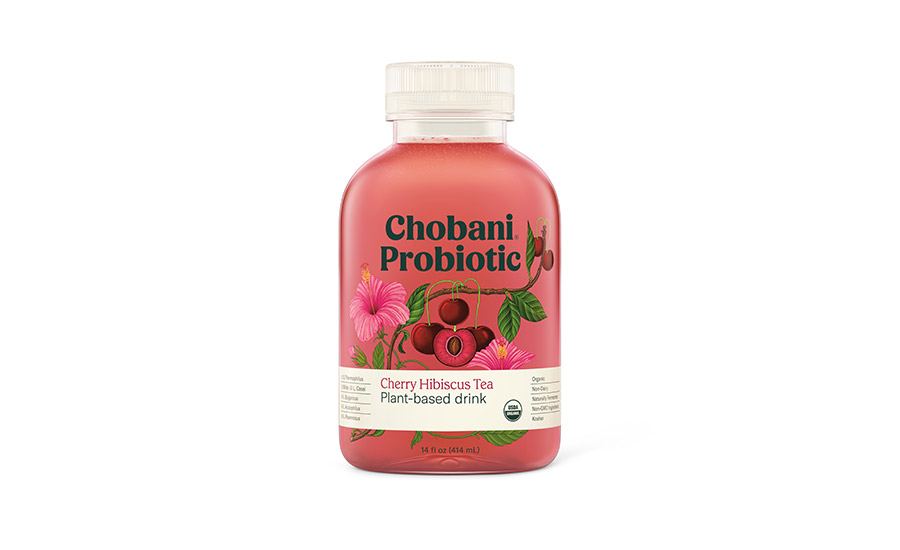
In July, the company released the Chobani Probiotic drink line and the Chobani Complete yogurt line, each of which boasts specific nutritional benefits.
Looking ahead, Greek yogurt will continue to be a major focus for Chobani — and it is a growing category once again, McGuinness points out. Although the category was challenged for several years, it started to pick up steam again in late 2019.
“And Greek yogurt specifically, because of the nutrient density — it’s like the original superfood in that it’s high-protein, low-sugar — was growing probably 4%, 5%,” he says. “Then the pandemic hit and yogurt accelerated even more. So now yogurt’s growing 2%, 3%, and Greek is growing 6% to 7%. So Greek is driving most of the category growth.”
Spirit of philanthropy
When the coronavirus pandemic hit back in March, many food and beverage companies engaged in efforts to help those impacted financially by shutdowns and more. Chobani was no exception.
The company started shipping a truck a day to a variety of food banks, donating (thus far) close to 7 million products, McGuinness estimates.
“That was fresh product, not expired donated product,” he says. “So in addition to trying to meet all the demand and ship on time and in full, I asked everybody to make more products and give them to those in need.”
The truck-a-day effort is part of the Chobani Pantry program the company announced in April. The program also includes the donation of Chobani’s digital brand (online advertising, website, social media and beyond) to Feeding America — the nation’s largest domestic hunger-relief organization — and distribution of products at hospitals and other locations across the country where front-line workers need and deserve nutritious foods.
Chobani even turned its café in SoHo into a food bank, McGuinness says, giving away bags of free products over a period of four months. Participants in the Chobani Incubator program — aimed at mentoring small food companies (more on that later) — also provided products for the bags.
In addition, Chobani developed a Greek yogurt variety, Food Bank Batch in a PB&J flavor, specifically to benefit food banks during the pandemic. Sold in retail outlets from July through September, the product also is part of the Chobani Pantry program. All profits from the limited-edition flavor went to Feeding America.
“Food banks are on the ground addressing the increased need for food assistance in their communities,” Casey Marsh, chief development officer for Feeding America, says. “We are grateful for Chobani’s commitment to fighting hunger during this unprecedented time.”
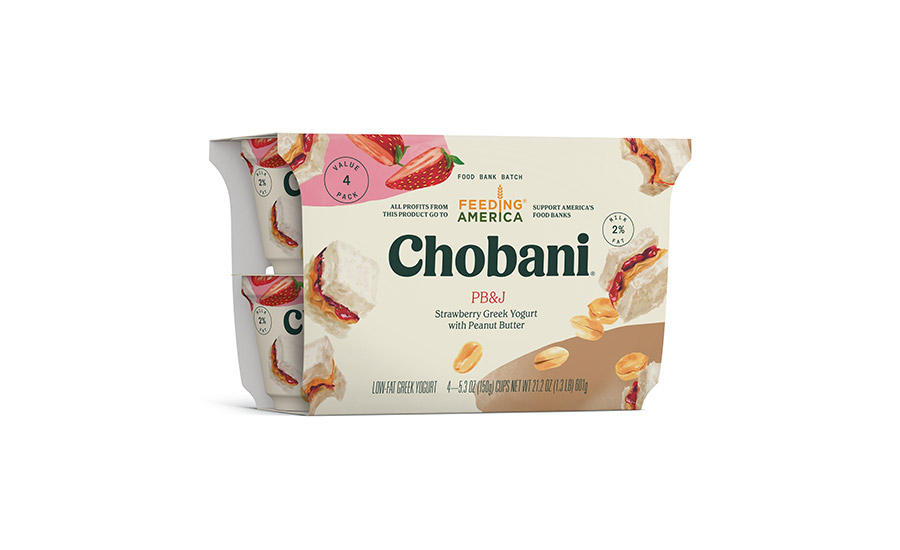
Chobani developed a Greek Yogurt variety, Food Bank Batch in a PB&J flavor, specifically to benefit food banks during the pandemic.
Chobani’s commitment to food banks did not begin with the pandemic, however. The company has had a long relationship with them — since its very beginning, McGuinness notes.
“It’s not like we woke up one day and said, ‘Oh, let’s help food banks.’ We said, ‘They need us now more than ever because there’s been a surge on food banks, and food insecurity is a pandemic within the pandemic,’” he explains.
In addition, Chobani says it is among a number of food processing partners that are participating in the $35 million Nourish New York program, an initiative to quickly reroute surplus agriculture products to the populations that need them most through the state’s network of food banks. In an Oct. 30 press release, New York Governor Andrew Cuomo noted that, to date, the program has purchased more than 16 million pounds of dairy, produce, meats and more from New York farmers; the products were distributed to 823,883 households across the state.
What’s more, the company says it is actively involved in the Curds & Kindness program from Dairy West, an organization that represents dairy farm families in Idaho and Utah with the goal of promoting the dairy industry and dairy products locally, nationally and globally. The Curds & Kindness program supplies needy people in Utah and Idaho with food that would otherwise go to waste due to the coronavirus.
For its part, Chobani provided approximately 375,000 yogurt cups to the program, helping to feed students in both states. The company says it also helps farmers find a home for their excess milk.
Moreover, Chobani is a participant in the Farmers and Families Food Box Program, which is part of the Coronavirus Food Assistance Program. Through this program, USDA’s Agricultural Marketing Service purchases fresh produce, dairy and meat products from American producers of all sizes. Distributors package these products into family-sized boxes, then transport them to food banks, community and faith-based organizations, and other nonprofits serving Americans in need.
“Starting in September and finishing up just now (October), we shipped over 2.6 million of Chobani products,” a Chobani spokesperson told Dairy Foods. “Importantly, we also did this at close to break-even price, as it helps our communities, and we don’t see this as a way to make a profit.”
An industry supporter
Chobani’s philanthropic efforts are not limited to the food-insecure. The company has engaged in a number of efforts to support the food and beverage industry, inside and outside the dairy arena.
One such program is Chobani Incubator. Launched in 2016, the program aims to “help small companies with big hearts and ideas challenge the food industry, improve broken systems and make a difference,” the company notes.
The three-month program, held annually, consists of on-site programming in New York, as well as visits to Chobani facilities, retailers and trade shows. Programming encompasses guest speakers, workshops, mentor rotations, field trips and more, Chobani says. It fits in with Ulukaya’s dedication to making “delicious, nutritious, natural and accessible food” — the reason the company calls its food philosophy its “DNNA.”
“The incubator is a pay-it-forward thing, and entrepreneur-to-entrepreneur,” McGuinness says. “And it’s really pure. All you have to do is be a natural food maker that wants to make accessible products. So if you want to make a $25 product and sell it just in Brooklyn or LA, we’re not your incubator.”
Although some other sizeable food companies now boast similar programs, Chobani’s was among the first. The company realized that most food startups fail, for a variety of reasons, and wanted to assist them in the path to success, McGuinness explains.
“So we said, ‘Hey, why don’t we share everything? Let’s let them inside the family and give them sessions on design, sessions on sales, sessions on retail execution, supply chain and QA — and then we’ll share all of our mistakes,’” he says. “Maybe if they don’t make those mistakes, they can accelerate even faster than we did and see around corners.”
Although Chobani provides the selected applicants with no-strings-attached grants and unfettered access to the company, it asks for nothing in return, McGuinness points out.
“It’s super fun. People love it, and … we’re proud of it,” he adds. “We’ve had close to 50 companies [having gone through the program], and the vast majority are minority, ethnic-based … so that’s really another beautiful thing.”
More recently, Chobani announced another major industry-support initiative — this one aimed specifically at dairy producers. Called Milk Matters, the program furthers the company’s commitment to positive transformation of its “milkshed,” supporting the economic, environmental and social impacts of its No. 1 ingredient: fresh milk from local farms. The initiative will also support greater transparency across dairy farms.
Milk Matters includes co-op partners, dairy farms and third parties such as Fair Trade USA, the World Wildlife Fund, the National Milk Producers Federation, Cornell University, state programs and community foundations in Idaho and New York to validate the continued progress, Chobani noted when it announced the initiative in 2019. The goal is 100% implementation by 2025.
“Proud to share our vision for the future of dairy — from cows to people to planet,” Ulukaya said at the time of the program’s launch. “It’s a small step with a big message: The future of dairy farmers matters to all of us.”
The program encompasses six critical pillars, including worker well-being, environmental stewardship, animal care, local sourcing, investment in dairy communities, and freedom and flexibility for dairy farms.
As McGuinness explains, dairy farms are closing at an alarming rate, a reality that is not getting enough attention. In fact, an average of five dairy farms have closed per day over the last 10 years. So Chobani created the program to help them.
“It’s a multi-pronged program,” he says. “Part of it is the first-ever Fair Trade certification for U.S. dairy, but there’s also animal welfare, there are sustainability components to it. There’s just general marketing around the nutrient benefits of dairy. There are scholarships and grants as part of it. But it’s all designed to support the dairy industry.”
People over profits
Chobani long has been a standout within the employee-relations arena, too, and recent efforts here only solidify that reality. For example, the company stepped up employee-related safety efforts very early on in the pandemic.
“We set out in the second or third week of March to just really focus on the plants,” McGuinness explains. “Demand was there, so we set out as a company to do a few things. No. 1 [was to] keep our employees safe and supported. … We were doing temperature checks by the third week of March and health screens by the third week of March.”
Another important goal was to keep the factories running 24/7, he notes. So the company mandated masks in March and also helped subsidize childcare for plant employees.
“We have not had a day of interruption since the pandemic began because we’ve been keeping our employees safe and supported,” McGuinness shares. “We’ve also given our front-line workers extra bonuses and things like that because it’s the right thing to do.”
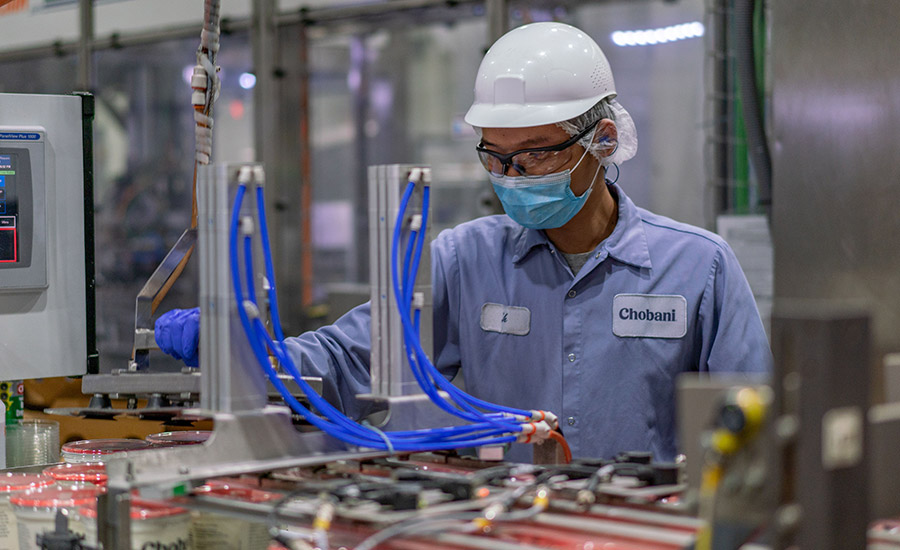
Chobani mandated masks early on in the pandemic — in March — and also helped subsidize childcare for plant employees.
The extra support has not been limited to in-plant employees. A lot of Chobani’s retail partners have faced labor shortages, he notes, so the company’s retail execution team served as a second team of front-line workers, going into stores, packing out and ordering products, and even building displays.
But since its founding, Chobani says it has believed that businesses should take care of their employees first. The company offers a number of programs that mesh with this philosophy. For example, Chobani Rewards is an initiative that allows every full-time employee to share in the growth of Chobani over time. In addition, the company implemented a paid parental leave policy in 2017 that offers 100% paid parental leave for six weeks for all full-time hourly and salaried employees.
And in October, Chobani demonstrated an expanded commitment to putting its “people over profits” by announcing plans to increase its starting hourly wage to at least $15 an hour, more than double the federal minimum wage, beginning in the first quarter of 2021.
As a result of this increase, Chobani's average hourly rate at the company's manufacturing plants in South Edmeston, N.Y., and Twin Falls, Idaho, will be approximately $19 an hour. Moreover, for Chobani's hourly employees in New York City, including those who work at the Chobani Café in the SoHo neighborhood of Manhattan, the company says it is raising minimum starting wages to $18 an hour, given the region's high cost of living.
"This moment of uncertainty is a call for us to join together to strengthen communities and support those working tirelessly to make the food on the tables of families across America," Ulukaya said at the time of the announcement. "Businesses should serve the people and communities in which they operate. Raising our base starting salary is the right thing to do, and we hope other businesses, particularly food manufacturers, feel the same as we all work toward rebuilding our country."
Expect more of the same
Looking ahead to the next year and beyond, Chobani has no plan to compromise on its commitments to innovation in the name of “delicious, nutritious, natural and accessible food,” as well as to doing good within and outside of the company.
“We’re going to do more of the same because we are innovating,” McGuinness stresses. “We are doing good in the world, and we are doing things like Milk Matters to help farmers across their entire operation. … We love to compete. But the more successful we are, the more good we can do in the world.”

.jpg?t=1606835021&width=1080)

















